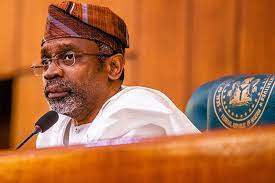The Speaker of the House of Representatives, Femi Gbajabiamila, says the country will be at peace even as Nigerians await the outcome of Saturday’s presidential and National Assembly elections.
Nigerians came out to cast their votes in the February 25 polls in what may be described as the most keenly contested in Nigeria’s history. The Independent National Electoral Commission (INEC) has been battling with the compilation of results across the respective states.
There have been allegations of rigging and massive collusion between the electoral body and the ruling party but Gbajabiamila is optimistic that Nigeria will rise above the worse expectations many Nigerians may have at the moment.
“Nigeria will be at peace because we will work through the law and due process to resolve differences, settle disputes and ensure the peaceful transition of power,” he said on Tuesday, February 28.
“I am confident we will rise above the worst expectations others may have of us in this defining this moment.
“We will resist malign actors seeking to exploit this moment of tension for their own ends. We will defeat the cynicism of those waiting to see their worst predictions for our country become real.”
See the full statement by the Speaker below:
REMARKS BY THE SPEAKER OF THE HOUSE OF REPRESENTATIVES, REP. FEMI GBAJABIAMILA AT THE RESUMPTION OF PLENARY AFTER THE 2023 PRESIDENTIAL AND NATIONAL ASSEMBLY ELECTIONS.
TUESDAY, 27TH FEBRUARY 2023
Good morning and welcome back to the House of Representatives. I am glad to see you all today, and I thank you for being here this morning.
Do Our country has just been through a hotly contested general election. as we gather here this morning, the election results are still being collated and announced. We expect shortly to be informed who will be the next president of our republic and the people who will represent Nigerians in the 10th assembly. Elections in a multi-ethnic, multi-religious and multi-party democracy too often devolve into fault lines, generating abundant conflict and controversy. The test of an advanced democracy is the ability to manage grievances and settle disagreements without causing fatal damage to the body polity.
The constitution of our republic and the Electoral Act that governs elections in Nigeria both define a framework of post-election dispute resolution and adjudication. This framework exists to protect the integrity of our elections. It ensures that when elections fail to meet expectations, contested issues of facts and law can be resolved through due process within a legal framework befitting a constitutional democracy. It is not in the interests of our country, now or ever, to advocate for or embrace extra-legal interventions to resolve electoral disputes and address grievances.
We must avoid actions or utterances that set the stage for interventions that could be fatal to our democracy and the gains we have made over the last two decades. This is the time, despite whatever disappointments we may each feel, to reject considerations of partisan and other interests to come together and make sure first that our country survives and our imperfect democracy continues its march towards progress and a more perfect union.
This is the time for political, social, religious and economic leaders across the nation to work steadfastly together towards the ends of law and due process. I am confident we will rise above the worst expectations others may have of us in this defining this moment. We will resist malign actors seeking to exploit this moment of tension for their own ends. We will defeat the cynicism of those waiting to see their worst predictions for our country become real. Nigeria will be at peace because we will work through the law and due process to resolve differences, settle disputes and ensure the peaceful transition of power.
In the meantime, the work of governance continues here in the House of Representatives even as we count down to the end of our term in the 9th assembly. We will also begin to prepare transition notes at the Committee levels, as earlier proposed, as part of our reforms to build institutional memory and ensure continuity in governance. And we will continue reviewing legislative actions, interventions, successes and failures relating to the implementation of the 9th House of Representatives legislative agenda, which we began in January. As I said then, this is the basis of our report card to the Nigerian people at the end of our term. But just as importantly, it will allow us to better understand where we succeeded and where we didn’t as a guide for the future.
Honourable colleagues, I welcome you to the House of Representatives. And I thank you most sincerely for your presence here this morning.
God bless you all, and God bless the Federal Republic of Nigeria.

